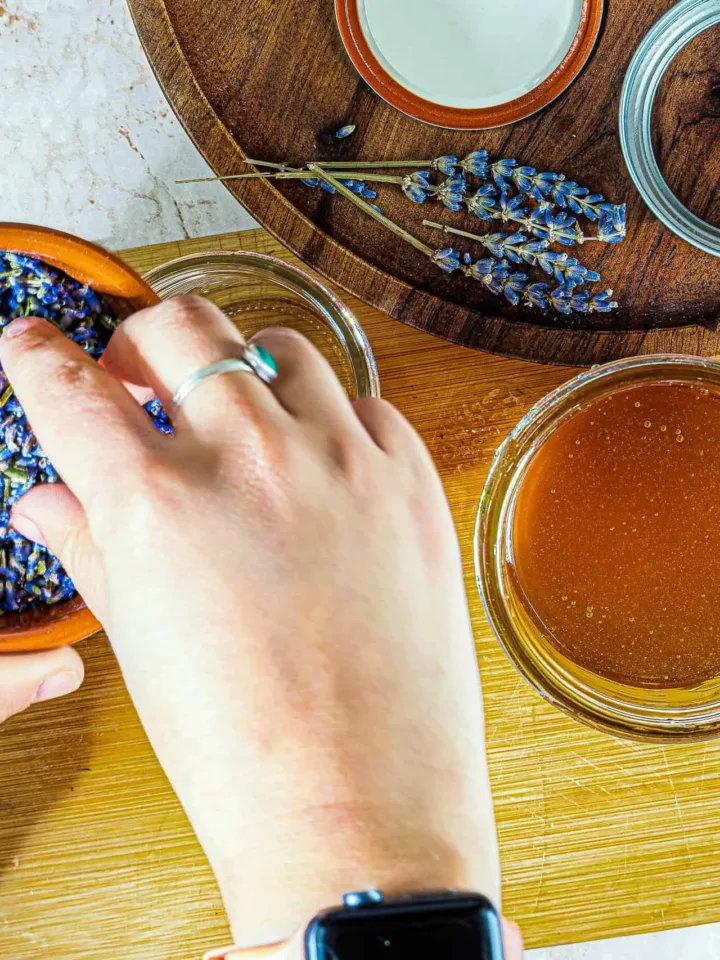Making dehydrated onions is a great way to take advantage of onions without all those onion tears away, and it makes the chore of chopping onions much more tolerable. You've got homemade onion powder if you grind these dried onion pieces. Boom, food storage win!

Dehydrating vegetables is a great way to preserve your garden harvest or if you found onions on sale. If you want to make your own vegetable powder, use a mix of dried vegetable flakes that you've preserved over time.
When you dehydrate onions, you concentrate on the taste. This is especially true if you're crushing onion pieces into powder.
Jump to:
Why dehydrate onions?
Dehydrating food is an easy way to reduce food waste and is a component of your long-term storage strategy. Also, if you have chopped onion and not used it all right away, the rest can go bad quickly.
Making dehydrated powder helps cut down on pantry storage, and your waste is less, and the onions will be ready to use whenever you need them.
My dehydrator is one of my favorite tools, and dehydrated food can be a great addition to your slow-living pantry. Dehydrated onions can also be instrumental in cooking.
They don't overpower your dish like fresh onions and have a nice subtle flavor and texture. I especially love using them in chili because they plump up nicely when rehydrating.
Equipment
The equipment you need to dehydrate an onion is pretty basic; no fancy gadgets are required. Just your dehydrator, trays, non-bleached parchment paper, mandoline, or knife and bowl for soaking.
For this project, I used my Nesco dehydrator. It has four trays but can stack up to twelve of them. It's a basic model and it gets the job done!
I recommend using a mandolin slicer, making sure to slice onions as thin as possible. It makes it easier to get everything sliced at the same thickness.
I also recommend using a sharp knife such as this one to cut your onions in half before slicing them thinly with a mandolin slicer. I tend to prefer to cut my onion slices into smaller pieces.
Ingredients
Selecting the right kind of onions to dry depends on the flavor preference and how you plan to use them. Several different types of onions can all be dehydrated. However, I have found that red onions are the best ones to use when dehydrating them. The reason is that they have a milder onion taste.
Onions take about 10-12 hours in the food dehydrator, but red onions take less time than others.
A white onion will give you want a crispier texture. I like how red onions rehydrate better, but it is up to you which ones you want to use.
Make sure to use onions of the highest quality to be as fresh as you can at your grocery store.



Dehydrating onions in a food dehydrator
Using a dehydrator can be very easy and does not require much time or effort. You will need to follow a few simple steps and you will have delicious onions that can be used as toppings for salads or other foods.
The first step is to peel and cut onion into thin slices. Using a sharp knife, cut up the onion into about ⅛ inch thick pieces.
Next, place the sliced onions onto dehydrator trays. You will want to place them in a single layer so they do not overlap. If you are using more than one tray, it is a good idea to put a piece of parchment paper on each tray to help keep the onions from falling through the holes in the tray or sticking to the tray's surface.
After all your onions are on the trays, set your dehydrator at 125 degrees Fahrenheit and let it run until all the water has been removed from your onions, the drying time can take anywhere from four hours to overnight, depending on how much moisture was in your onions when you started dehydrating them. The temperature may vary depending on your dehydrator's instructions.
When they are finished drying, store them in a jar with a lid and condition them to ensure there isn't excess moisture.
How to make Dried Onion Flakes in the Oven
Are you looking to dehydrate extra onions but don't have access to a dedicated dehydrator? Whether you're looking to make onion powder or flakes or preserve your onion harvest, you're in luck!
It is extremely easy to dehydrate in your oven. Dehydrating food in a home oven is a similar process with some slight adjustments and a couple of key equipment. Here's how to do it.
Set your range's temperature to the lowest setting. To keep your heat as low as possible, prop open the oven door with a hand towel or a wooden kitchen utensil. If you are concerned about fluctuating temperatures or working with an older oven, buy a thermometer that hangs from your wire rack! That way, you can view it easily.
Chop your onions into small pieces and to a parchment-lined baking sheet, add your onions.
How to make dried onion powder
Make your dehydrated onion powder with your onions. Using a coffee grinder, or blender, pulse your chopped onions until they become a fine powder to be stored for a long time!
To ensure your onion powder stays dry, add a few pieces of uncooked rice to absorb any moisture.
Storing dehydrated onion
Store dried minced onions in a dry place in an airtight container or vacuum-sealed. Your onions will keep for several months at room temperature if kept out of direct sunlight. If you live in a humid location, store them in your refrigerator or freezer (they will last longer).
To store your onions or powder, you can put them in a jar with a lid. I like to make a couple at a time because I keep one jar for immediate use, and then I put the rest in my pantry.
If you are using your dehydrated onions within a few months, no problem. Of course, they will last longer than that, but if you want to ensure the most extended shelf life possible, I would recommend using the oxygen absorbers.
Storing Onion Powder
I usually store the dried powder in pint-size mason jars, which are super heavy-duty glass bottles made to last forever. They come in all different sizes and have lids (I always recommend getting the top with a rubber seal). Mason jars are reusable and environmentally friendly!
How to hydrate dried minced onion
Use dried onion flakes in dishes that call for fresh onions. This is a good way to save money, as dehydrated onions are much cheaper than fresh onions and can be stored in bulk.
Just use the following steps to hydrate your minced dried onions.
Pour ¼ cup of water into a microwave-safe bowl, then ¼ cup of onions into the water, and stir.
Place the bowl in the microwave and heat it on high for two minutes. Remove the bowl from the microwave and set it on a countertop or tabletop with a potholder.
Let the bowl cool until you can safely touch it again with your bare hands. Strain off any extra water from the bowl and use your hydrated onions as desired in any dish that calls for them.
Tips for Drying Onions
The easiest way to dry onions is in the dehydrator, but a challenge I found is that the smell of onions travels throughout the house! I tend to do any onion-related dehydration projects outside or in a well-ventilated room.
Drying time may vary, so it'll be wise to check on it as the dehydrating process can vary depending on any moisture in the air. On humid days with excess humidity, the dehydrator will have to run more often.
How to use dry onion flakes
Instead of cutting up fresh onions, use dried ones! One tablespoon of dried onion flakes minced pack the same punch as one whole onion. You can use dehydrated onions in all sorts of ways:
Reconstitute onion flakes with boiling water, which makes them easy to use. You can also use them as snacks or make them into dip, soup or stew.
Make a dried soup mix by adding dried herbs, spices, and a few other vegetables you have dried. Vegetable mixes are the perfect shortcut for quick weeknight meals.
Use them in a pot of beans! If you are rehydrating overnight, toss in some onions, and you are steps ahead in your cooking.
Dehydrated onion flakes are good in sauces, stock or any dish that calls for fresh onion. The flavor will be more concentrated than fresh, so be careful when cooking.
Save your onion skins! These peels can be used in different ways, including mixing vegetable powder.
How to use Onion Powder
Once you've got your dehydrated powder, there are lots of ways that you can use it in the kitchen. Using powder in small amounts is a good move because the flavor is much more intense once foods are dehydrated. Here are some ideas to get started.
Make some onion dip by adding some powder to sour cream! Mix in some dried minced flakes for some added onion texture.
If you've had the opportunity to dehydrate other alliums like leeks, scallions, or green onions, add those flakes to this powder, and make a super onion seasoning blend!

📖 Recipe

How to Make Dehydrated Onions
Dehydrating onions saves money and they are handy to have around when you need to cook something quick, or whip up some soup on a cold day. They keep for months and months in a sealed container or zip lock bag.
Ingredients
- 1 medium onion, or ½ of. a large onion, chopped
Instructions
- Cut the root of a large onion and peel off the skin
- Cut into ¼ inch slices (julienne slices) or ¼ thin rings (the narrower, the better for drying)
- Turn the temperature dial on your dehydrator to 125 degrees
- Place your diced onions on your dehydrator trays in a single layer
- Dry for 8-12 hours or until completely dry and brittle. Occasionally shake to prevent sticking together.
- Once you remove your dried onion pieces, add them to a jar and make sure to condition them to ensure there isn't excess moisture.
Notes
To rehydrate dried onion pieces, put them in a bowl and add ⅓ cup of hot water for every ½ cup of dried onion. Let them sit for 15 minutes or so, until they plump up, then squeeze out the excess water and use them as directed in your recipe.
Nutrition Information:
Yield:
5Serving Size:
1Amount Per Serving: Calories: 14Total Fat: 0gSaturated Fat: 0gTrans Fat: 0gUnsaturated Fat: 0gCholesterol: 0mgSodium: 1mgCarbohydrates: 3gFiber: 0gSugar: 2gProtein: 0g







Zoe Campos says
Thank you for this comprehensive blog on how to make and store dehydrated onion. I like that you mentioned how one could use oxygen absorbers to extend their shelf life, as I recently found out that my boyfriend likes onion powder in his food. I should get dehydrated onion in bulk and suggest making onion powder together. https://goldenbaytraders.com/onion/
Stephanie Gravalese says
I think that's a great idea if you aren't drying out onions yourself to buy them in bulk and grind it up. It'll be a good opportunity to make just enough that he'll use. I think it's a good move to only grind it up in small batches that way it's the freshest. Thanks for stopping by, Zoe and hope you'll come back again!